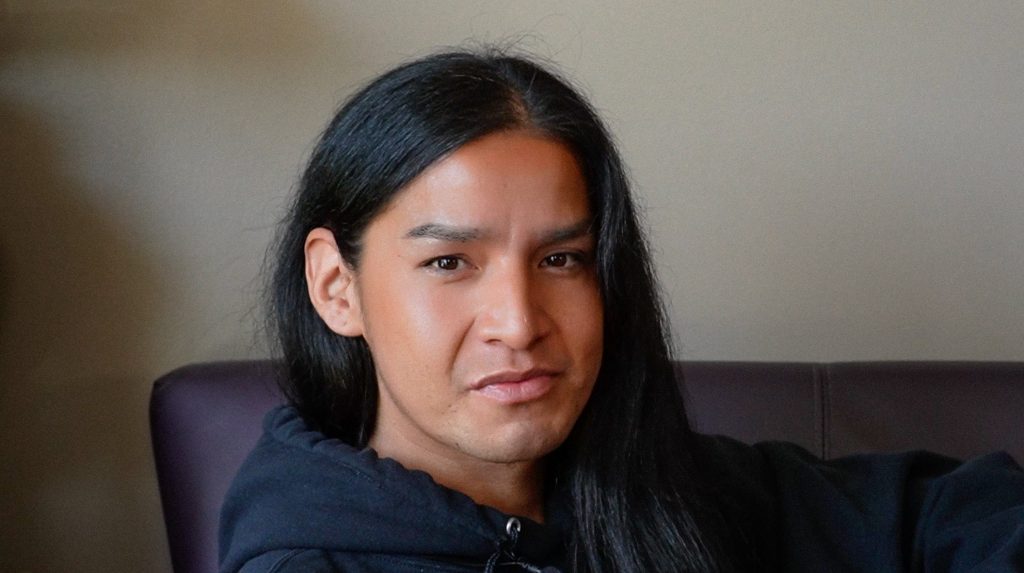Charlie’s Journey: A 2SLGBTQ+ Story
Charlie’s Journey: A 2SLGBTQ+ Story
For some Indigenous youth who identify on the 2SLGBTQ+ spectrum, finding themselves can be a scary, isolating experience.
It wasn’t until Charlie Wabano, a two-spirited person from Eabametoong First Nation (Fort Hope), started to grow out his hair that he began to embrace his identity.
“I struggled a lot with my identity, because I felt like I didn’t fit in with your normal, stereotypical ‘gay guy’ because of how feminine I was,” said Charlie, a former youth in care with Tikinagan Child & Family Services.
Along the way, the supports surrounding Charlie lifted him up and provided him the safe environment needed to find himself – even in high school.
“I was never bullied in school for being gay. All my friends embraced me as I am. They never really said anything. ‘You’re like you’re just Charlie to us.’”
One of the biggest allies for Charlie was his foster parent, Rhonda Konrad, who knew him since he was a young boy.
Charlie’s positive experience in care and living with Rhonda has always been a journey of openness, acceptance, and love.
“(Rhonda) was always supportive of my choices and decisions, even if she didn’t like them sometimes, but she was always so encouraging of self-expression and being myself, which has helped shape me to this day,” shared Charlie.
Although she suspected Charlie may end up on the 2SLGTBQ+ spectrum early on, it wasn’t until he was a young teenager that he nervously came out to Rhonda.
“I was like, ‘You know, Charlie, I love you. And just so you know, I kind of guessed,’” recalled Rhonda.
What can other Foster Parents learn from Charlie and Rhonda?
As a former Foster Parent with Tikinagan for more 20 years, Rhonda encourages foster parents today to allow youth to be themselves, which she believes is essential in helping shape their identity.
“You’re never going to know if that child will end up growing up to be on that LGBT spectrum, so I think every caregiver has to be prepared and open that that may be part of your parenting experience,” she said.
For Charlie and Rhonda, the acceptance of the 2SLGTBQ+ community comes from open-mindedness and the key to open-mindedness comes from listening and getting to know someone.
“I think you have to listen and be there for that person, that child, that youth, and then just learn from them,” said Rhonda. “I do know for a fact that if caregivers do not support children and youth who are on this spectrum, children youth run the risk of self-harm, mental health issues and risk of suicide and it’s not worth it to lose a single child to this. I think if anyone ever rejected someone or who is on that spectrum, they miss all the blessings because Charlie has been one of my greatest blessings in my life. If I had been that way, we would have missed that and our journey together.
“He taught me. I’ve taught him, and we’ve grown together.”
Charlie’s hope for other 2SLGTBQ+ youth in care is that they have the freedom to express themselves. He encourages Foster Parents to be better prepared to support a 2SLGTBQ+ youth by educating themselves by participating in workshops, attending group events, and talking to other Foster Parents raising 2SLGTBQ+ youth.
“It’s really important because it’s through their expression that they’re going to learn who they are, in which direction they’re going to go in with their life. I mean, if it wasn’t for Rhonda, I don’t think I’d be who I am today.”
Becoming a role model for First Nation youth
Charlie added that having a good support system, including examples of people within the 2SLGTB+ community, benefit youth identity formation.
“I had people here within my support system, so it was very easy for me to find this support and I know it’s not like that for everybody, but if there is somebody that you can identify with then talk to them,” said Charlie.
Now living back in Eabametoong where he was one of the first in his community to identify as two-spirited, Charlie and other 2SLGTB+ individuals gather as their own little community to hang out, go to the beach, play volleyball and more. In return, they have a strong commitment to their community, participating in events and engaging in their community.
“We’re in positions where we’re able to be identified as somebody in our community for youth to look up to, that’s our main goal is to show that we are there, and we mean no harm. We just want to better our community.”
Watch our interview with Charlie and Rhonda now!


